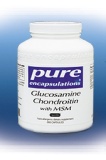| Chondroitin is best known to the general public as a remedy for osteoarthritis, which is a form of arthritis caused by wearing away or degeneration of the cartilage that cushions the ends of bones. Chondroitin helps to keep cartilage resilient by absorbing fluid
(particularly water) into the connective tissue. It is also believed to block enzymes that break down cartilage and it provides the building blocks needed for cartilage to repair itself. Chondroitin sulfate not only provides additional organic sulfur to the formula for incorporation into cartilage but it also has a synergistic effect with glucosamine since its structure provides galactosamine which is a different pathway than that used by glucosamine.
Chondroitin sulfate is a glycosaminoglycans that provides a further substrate for the synthesis of the proteoglycans. The building blocks for collagen are amino acids, especially proline, glycine and lysine. Proteoglycans are large and complex macromolecules comprised mainly of long chains of modified sugars called glycosaminoglycans or mucopolysaccharides. Generally, chondroitin sulfate is a biological polymer derived from connective tissue. Chondroitin stimulates proteoglycan production and collagen and hyaluronic synthesis. It thus appears to act as a 'building block' for the synthesis of cartilage, thereby slowing the progressive degradation which occurs in osteoarthritis. Hyaluronic acid acts as a lubricant between connective tissues of the skin, protects the joints by providing shock-absorption, and helps the body retain skin moisture.
Specifically, chondroitin sulfate A has proven to be an effective anti-inflammatory that improves blood circulation, prevents ischemic heart disease, reduces incidences of heart attacks, reduces incidences of strokes, and is also effective in supporting connective joint tissue. Insofar as Chondroitin sulfate helps prevent heart disease, this phenomenon is due to the inherent antithrombogenic or anticoagulant properties which prevent abnormal blood clots and reduce the incidence of strokes. Chondroitin sulfate B is found in the dermis of the skin and is also one of the constituents responsible for maintaining viscoelasticity of the skin. Chondroitin sulfate C inhibits elastase, an effect which may provide some analgesia and contribute to the slowing of cartilage degradation. |
 Sulfur-containing methylsulfonylmethane (MSM) is included in this glucosamine and chondroitin combination to provide an enhanced spectrum of nutrients for optimal cartilage matrix composition, connective tissue strength, and joint comfort. Glucosamine promotes the synthesis of the glycosaminoglycan chondroitin sulfate. Chondroitin sulfate is responsible for building the ground substance of cartilage, molecules known as proteoglycans. In addition, chondroitin sulfate may maintain healthy enzyme activity. An important role of sulfur from MSM is to enhance the structure and integrity of proteoglycans. Click here for more information.
Sulfur-containing methylsulfonylmethane (MSM) is included in this glucosamine and chondroitin combination to provide an enhanced spectrum of nutrients for optimal cartilage matrix composition, connective tissue strength, and joint comfort. Glucosamine promotes the synthesis of the glycosaminoglycan chondroitin sulfate. Chondroitin sulfate is responsible for building the ground substance of cartilage, molecules known as proteoglycans. In addition, chondroitin sulfate may maintain healthy enzyme activity. An important role of sulfur from MSM is to enhance the structure and integrity of proteoglycans. Click here for more information.